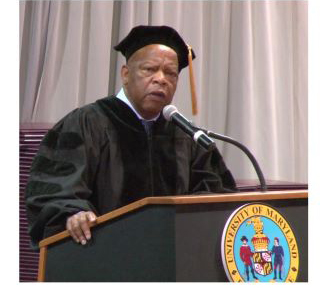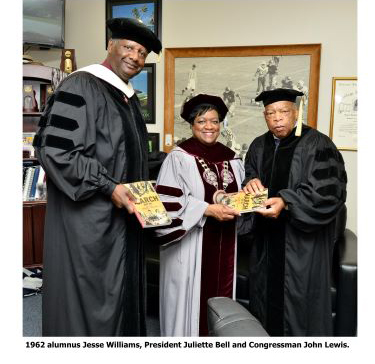
Congressman John Lewis relied on no formal remarks when he delivered the commencement address May 16, 2014 at the University of Maryland Eastern Shore.
He didn’t need to.
Lewis had a life rich and full of experiences carefully catalogued in his head that a half-century earlier took its share of beatings by police and anti-civil rights vigilantes.
It was not his first time in Princess Anne to engage with local college students. As chairman of the national Student Non-Violent Coordinating Committee, the 24-year-old Lewis visited in late February 1964 to investigate highly publicized clashes between police and Maryland State students protesting local restaurants that refused to serve Blacks.
News accounts described officers employing dogs, fire hoses and clubs to break up the demonstrations. Lewis was quoted as blaming “state police” for instigating violence that sent some students to the hospital.
Lewis was one of the faces of the mid-20th century’s civil rights movement alongside the late Dr. Martin Luther King Jr., a mentor he noted had also been Maryland State’s commencement speaker (in 1959).
On March 7, 1965, Lewis found himself face-to-face with stick-wielding police when he and fellow activists attempted to cross the Edmund Pettis Bridge in Selma, Ala. in a peaceful march to protest vote law inequities.
Network television cameras and newspaper photographers captured a gut-wrenching scene that showed Lewis, wearing a trench coat and backpack, enduring a brutal beating from police. The confrontation shocked the country, and shamed Congress into enacting the 1965 Voting Rights Act.
“If someone had told me when we were walking across that bridge in Selma – left beaten, left bloody and unconscious – that one day I would live to see a man of color as president of the United States,” Lewis told the class of 2014, “I would have said ‘you must be crazy, you must be out of your mind’.”

Those in the Hytche center audience old enough to remember sat transfixed. Some nodded in agreement. Others looked down, perhaps reflecting on similar experiences they knew about – or had themselves.
“Find a way to get in trouble – good trouble, necessary trouble,” Lewis said. “Make our country what our country should be, and help change the world. You can do it.”
The first installment of a critically acclaimed graphic novel series that told Lewis’ life story in comic book-style was published in August 2013. “March” was aimed at young readers who might not fully grasp the importance of the civil rights struggle. UMES graduates and platform guests received a complimentary copy that day.
Lewis talked about growing up in the segregated South on a sharecropper’s farm where as a youngster he preached to chickens, one of his signature anecdotes.
“I’m convinced that some of those chickens that I preached to in the ’40s and the ’50s tended to listen to me much better than some of my colleagues listen to me in the Congress,” he said. “And some of those chickens were a little more productive. At least they produced eggs.”
Being barred from his town’s library because of the color of his skin and relegated to sitting in the balcony of the local movie theater inspired an adolescent Lewis to choose fighting for civil rights as his life’s work.
“You’ve to get up, speak up, speak out and move your feet,” he said. “The world is waiting for you.”
Lewis also spoke of forgiveness. Elwin Wilson, a former Ku Klux Klansman who had beaten him during a 1961 “Freedom Ride” protest, went to see Lewis in February 2009. Wilson’s son accompanied him. (Wilson died in 2013)
“Will you forgive me?,” Lewis said Wilson asked. “His son started crying. He started crying. I started crying. He called me ‘brother.’ I called him ‘brother.’”
“Someplace along the way, if we get it right here in America, we lay down the burden of the vision of separation,” he said. “We can create the beloved community, and be a model for the rest of the world.
Like most gifted commencement speakers, Lewis challenged his audience that historic spring day at UMES.
“Go out there and fight the good fight,” he said. “And never, ever give up. Be bold. Be courageous. And find a way to get in the way.”
Lewis died July 17, 2020; the nation reflected on the civil rights icon’s inspirational life story that he drew from during his 14-minute commencement address to the class of 2014.

